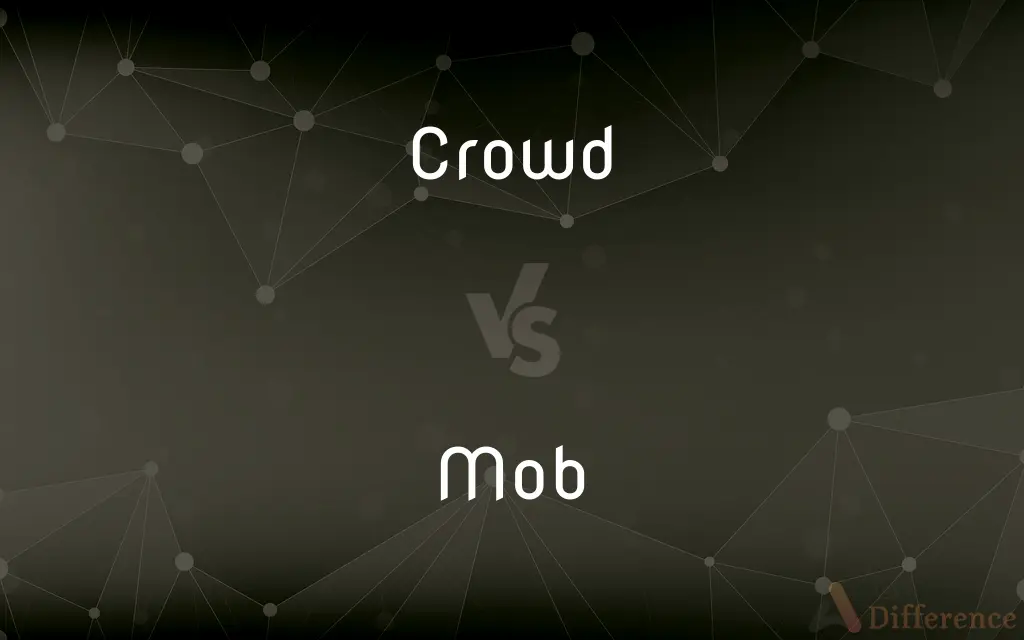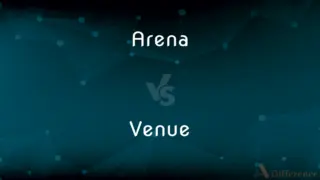Crowd vs. Mob — What's the Difference?
By Tayyaba Rehman — Updated on October 25, 2023
Crowd refers to a large group of people gathered closely, while Mob often implies a disorderly or unruly group with potential aggressive intent.

Difference Between Crowd and Mob
Table of Contents
ADVERTISEMENT
Key Differences
A Crowd typically represents a large gathering of people. This gathering may be due to various reasons such as an event, attraction, or simply the density of a particular place. The term does not inherently carry negative connotations. In contrast, a Mob is not just a group of people; it often has a connotation of being disorderly, aggressive, or even destructive. The intent behind the gathering significantly differentiates these two terms.
In everyday language, when we mention a Crowd, we might be referring to spectators at a sports event, attendees at a concert, or shoppers during a holiday sale. However, when we speak of a Mob, it suggests a gathering that's chaotic, perhaps even with a common purpose that could be violent or disruptive, such as a mob causing a riot or lynching.
It's crucial to understand the context in which these terms are used. A peaceful Crowd can turn into a Mob if incited or provoked. The primary difference lies in the behavior and the implications associated with these groups. The term "mob mentality" further emphasizes the negative aspects of group behavior when individuals may act out of character because they are part of a larger unruly group.
Both Crowd and Mob can affect the dynamics of a situation. A large Crowd at an event might necessitate additional security or logistical considerations. Meanwhile, the presence of a Mob might call for immediate police intervention or even a declaration of a state of emergency.
Comparison Chart
Definition
A large gathering of people.
A disorderly group, often with harmful intent.
ADVERTISEMENT
Connotation
Neutral or positive.
Often negative or aggressive.
Organization
Can be structured or random.
Typically chaotic.
Common Gathering
Events, attractions, places.
Protests, riots, aggressive acts.
Behavior
Generally peaceful.
Can be violent or disruptive.
Compare with Definitions
Crowd
People who are close to someone in terms of friendship or association.
She introduced me to her crowd.
Mob
A criminal organization or gang.
The city was once under the control of the mob.
Crowd
To gather in large numbers, filling a space.
Fans crowded the concert hall.
Mob
The common people or masses.
The politician lost touch with the mob.
Crowd
Generally speaking, a crowd is defined as a group of people that have gathered for a common purpose or intent such as at a demonstration, a sports event, or during looting (this is known as an acting crowd), or may simply be made up of many people going about their business in a busy area. The term "the crowd" may sometimes refer to the lower orders of people in general.
Mob
To crowd around and harass or attack.
Reporters mobbed the celebrity as she left the restaurant.
Crowd
A large number of persons gathered together; a throng.
Mob
An act of surrounding or overwhelming someone.
The player was mobbed by his teammates after the winning shot.
Crowd
The common people; the populace.
Mob
A large and often disorderly crowd. ]
Crowd
A group of people united by a common characteristic, as age, interest, or vocation
The over-30 crowd.
Mob
A large or disorderly group of people; especially one bent on riotous or destructive action.
Crowd
A group of people attending a public function; an audience
The play drew a small but appreciative crowd.
Mob
(archaic) The lower classes of a community; the rabble.
Crowd
A large number of things positioned or considered together.
Mob
(collective noun) A group of animals such as horses or cattle.
Crowd
An ancient Celtic stringed instrument that was bowed or plucked. Also called crwth.
Mob
(collective noun) A group of kangaroos.
Crowd
Chiefly British A fiddle.
Mob
(collective noun) A flock of emus.
Crowd
To gather together in a limited space
The children crowded around the TV.
Mob
A mafia: a group that engages in organized crime.
Crowd
To move forward by pressing or shoving
A bevy of reporters crowded toward the candidate.
Mob
(video games) A non-player character, especially one that exists to be fought or killed to further the progression of the story or game.
Crowd
To force by pressing or shoving
Police crowded the spectators back to the viewing stand.
Mob
(Australian Aboriginal) A group of Aboriginal people associated with an extended family group, clan group or wider community group, from a particular place or country.
Crowd
To force away by taking up space; displace
Urban sprawl crowded the farmers out of the valley.
Mob
(obsolete) A promiscuous woman; a harlot or wench; a prostitute.
Crowd
To draw or stand very near or too near to
The batter crowded the plate. Please don't crowd me.
Mob
A mob cap.
Crowd
To press, cram, or force tightly together
Crowded the clothes into the closet.
Mob
Abbr of mobile phone
Crowd
To fill or occupy to overflowing
Books crowded the shelves.
Mob
(transitive) To crowd around (someone), sometimes with hostility.
The fans mobbed a well-dressed couple who resembled their idols.
Crowd
(Informal) To put pressure on; assail
Dark thoughts were crowding him.
Mob
(transitive) To crowd into or around a place.
The shoppers mobbed the store on the first day of the sale.
Crowd
(intransitive) To press forward; to advance by pushing.
The man crowded into the packed room.
Mob
(transitive) To wrap up in, or cover with, a cowl.
Crowd
(intransitive) To press together or collect in numbers
They crowded through the archway and into the park.
Mob
A mobcap.
Crowd
(transitive) To press or drive together, especially into a small space; to cram.
He tried to crowd too many cows into the cow-pen.
Mob
The lower classes of a community; the populace, or the lowest part of it.
A cluster of mob were making themselves merry with their betters.
Crowd
(transitive) To fill by pressing or thronging together
Mob
A throng; a rabble; esp., an unlawful or riotous assembly; a disorderly crowd.
The mob of gentlemen who wrote with ease.
Had every Athenian citizen been a Socrates, every Athenian assembly would still have been a mob.
Confused by brainless mobs.
Crowd
To push, to press, to shove.
They tried to crowd her off the sidewalk.
Mob
To wrap up in, or cover with, a cowl.
Crowd
(nautical) To approach another ship too closely when it has right of way.
Mob
To crowd about, as a mob, and attack or annoy; as, to mob a house or a person.
Crowd
To carry excessive sail in the hope of moving faster.
Mob
A disorderly crowd of people
Crowd
(transitive) To press by solicitation; to urge; to dun; hence, to treat discourteously or unreasonably.
Mob
A loose affiliation of gangsters in charge of organized criminal activities
Crowd
To play on a crowd; to fiddle.
Mob
An association of criminals;
Police tried to break up the gang
A pack of thieves
Crowd
A group of people congregated or collected into a close body without order.
After the movie let out, a crowd of people pushed through the exit doors.
Mob
Press tightly together or cram;
The crowd packed the auditorium
Crowd
Several things collected or closely pressed together; also, some things adjacent to each other.
There was a crowd of toys pushed beneath the couch where the children were playing.
Mob
A large and disorderly crowd of people.
The mob stormed the building in protest.
Crowd
(with definite article) The so-called lower orders of people; the populace, vulgar.
Crowd
A group of people united or at least characterised by a common interest.
That obscure author's fans were a nerdy crowd which hardly ever interacted before the Internet age.
We're concerned that our daughter has fallen in with a bad crowd.
Crowd
(obsolete) crwth
Crowd
A fiddle.
Crowd
To push, to press, to shove.
Crowd
To press or drive together; to mass together.
Crowd
To fill by pressing or thronging together; hence, to encumber by excess of numbers or quantity.
The balconies and verandas were crowded with spectators, anxious to behold their future sovereign.
Crowd
To press by solicitation; to urge; to dun; hence, to treat discourteously or unreasonably.
Crowd
To press together or collect in numbers; to swarm; to throng.
The whole company crowded about the fire.
Images came crowding on his mind faster than he could put them into words.
Crowd
To urge or press forward; to force one's self; as, a man crowds into a room.
Crowd
To play on a crowd; to fiddle.
Crowd
A number of things collected or closely pressed together; also, a number of things adjacent to each other.
A crowd of islands.
Crowd
A number of persons congregated or collected into a close body without order; a throng.
The crowd of Vanity Fair.
Crowds that stream from yawning doors.
Crowd
The lower orders of people; the populace; the vulgar; the rabble; the mob.
To fool the crowd with glorious lies.
He went not with the crowd to see a shrine.
Crowd
An ancient instrument of music with six strings; a kind of violin, being the oldest known stringed instrument played with a bow.
A lackey that . . . can warble upon a crowd a little.
Crowd
A large number of things or people considered together;
A crowd of insects assembled around the flowers
Crowd
An informal body of friends;
He still hangs out with the same crowd
Crowd
Cause to herd, drive, or crowd together;
We herded the children into a spare classroom
Crowd
Fill or occupy to the point of overflowing;
The students crowded the auditorium
Crowd
To gather together in large numbers;
Men in straw boaters and waxed mustaches crowded the verandah
Crowd
Approach a certain age or speed;
She is pushing fifty
Crowd
A large number of people gathered together.
The crowd cheered when the team scored a goal.
Crowd
A group of people who share a common interest.
The crowd at the comic convention was enthusiastic.
Crowd
To push or press closely together.
Don't crowd me; I need space.
Common Curiosities
Can a "Crowd" become a "Mob"?
Yes, if a peaceful crowd is incited or provoked, it can turn into a mob.
Can "Crowd" be used as a verb?
Yes, "to crowd" can mean to gather densely or to press closely together.
Is "Mob" just another term for "Crowd"?
No, a "Mob" implies a disorderly or unruly group, often with aggressive intent.
What is a basic definition of "Crowd"?
A "Crowd" refers to a large group of people gathered closely.
What is "mob mentality"?
It refers to the way individuals in a mob may act differently, often more aggressively, due to group influence.
How do event organizers manage large "Crowds"?
They may employ additional security, logistical considerations, and crowd control measures.
Is the term "Mob" always negative?
While "Mob" often has negative connotations, it depends on context. In some settings, it might just indicate a large group.
How do authorities typically respond to "Mobs"?
Authorities may deploy police or even declare a state of emergency in response to a mob.
Is a "Mob" always violent?
No, but it often has the potential for violence or disorder.
Is "Mob" used in terms of criminal organizations?
Yes, "mob" can refer to criminal organizations or gangs.
Can the terms be used interchangeably?
While sometimes used interchangeably, they have different implications, so it's essential to use them accurately.
Can "Mob" be used as a verb?
Yes, "to mob" can mean to surround or overwhelm someone, often in an aggressive manner.
Is every "Crowd" potentially a "Mob"?
Not necessarily. Many crowds gather for peaceful reasons and remain peaceful.
Can "Crowd" refer to a group of friends?
Yes, "crowd" can colloquially mean a group of friends or associates.
How are "Crowds" and "Mobs" depicted in media?
Crowds can be shown as spectators or attendees, while mobs are often shown as chaotic or aggressive groups.
Share Your Discovery

Previous Comparison
Arena vs. Venue
Next Comparison
Leak vs. PercolateAuthor Spotlight
Written by
Tayyaba RehmanTayyaba Rehman is a distinguished writer, currently serving as a primary contributor to askdifference.com. As a researcher in semantics and etymology, Tayyaba's passion for the complexity of languages and their distinctions has found a perfect home on the platform. Tayyaba delves into the intricacies of language, distinguishing between commonly confused words and phrases, thereby providing clarity for readers worldwide.














































